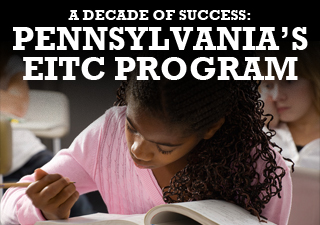Media
Taxpayers Benefit from School Choice
 I had a letter to the editor in Friday’s edition of the Philadelphia Daily News on the benefits of the expansion of school choice in Pennsylvania for taxpayers and students:
I had a letter to the editor in Friday’s edition of the Philadelphia Daily News on the benefits of the expansion of school choice in Pennsylvania for taxpayers and students:
Disappointing was the editorial arguing that the Educational Improvement Tax Credit— a decade-old, bipartisan-supported program that gives children educational options through voluntary business tax credits—”costs taxpayers.”
First comes the implication that businesses are not, in fact, taxpayers. Indeed, you seem to imply that citizens are best served when government takes more money out of the pockets of employers. But businesses are taxpayers, too, and they pass on the costs of their taxes to individuals through higher prices, smaller payrolls or less investment in the state.
Unfortunately, this falls into the typical tax-and-spend-proponent shell game that argues tax policy should seek to maximize the size of government. This attack on the EITC is befuddling, given that the expansion of educational tax credits, a $75 million increase, is less than public schools across Pennsylvania spend in one day.
More importantly, your lopsided argument ignores the savings of EITC. In 2010-11, the average EITC scholarship awarded for a student to attend a school of their choice was $1,099. In contrast, Pennsylvania school districts spent nearly $15,000 per student. In other words, the program offers scholarships to 13 students for the same cost as educating one in a public school. That is real savings to taxpayers, while offering students the opportunity to attend a better and safer school.
School choice saves—it saves students from violent and failing schools, and it saves taxpayers money by educating children at a lower cost.
Nathan A. Benefield
Director of Policy Analysis
Commonwealth Foundation